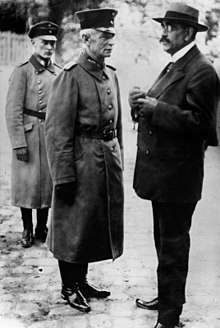Walther von Lüttwitz

Walther Freiherr von Lüttwitz (born February 2, 1859 at Jagdschloss Bodland , † September 20, 1942 in Breslau ) was a German infantry general who was best known for his leading participation in the Kapp Putsch .
Life
origin
He was the son of Ernst Freiherr von Lüttwitz (1823-1892) and his wife Cecile, née Countess Strachwitz von Groß-Zauche and Camminetz (1835-1910). His father was a Prussian captain a. D. , chief forester and dike captain . The later Prussian general of the infantry Hinko von Lüttwitz was his older brother.
Military career
Lüttwitz joined the Silesian Fusilier Regiment No. 38 of the Prussian Army on April 15, 1878 , coming from the cadet corps as a second lieutenant . On January 27, 1911, he took over as major general of the 39th Infantry Brigade in Hanover , and since March 20, 1911, he led the 2nd Guard Infantry Brigade in Potsdam. On January 1, 1914, he was appointed lieutenant general and was given command of the Hessian 25th division in Darmstadt.
During the First World War he held a number of high military posts. Since August 2, 1914, he was Chief of the General Staff of the 4th Army on the Western Front . Since September 26, 1914 he led the 33rd Division , from June 28 to September 28, 1915 he was commander of the 2nd Guard Division . From December 22, 1915 to August 20, 1916 he was Commanding General of the X Army Corps . On August 21, 1916 he became Chief of Staff of the 5th Army and was from October 27 to November 24, 1916 in the same role in the Army Group "Crown Prince Wilhelm" . From November 25, 1916 until the end of the war he was the commanding general of the III. Army Corps . In March 1918 his corps took part in the German spring offensive on the Somme in the St. Quentin area . For his achievements during the war, Lüttwitz was awarded the order Pour le Mérite on August 24, 1916 . On March 26, 1918, he had also received the oak leaves for the highest Prussian bravery award.
After the armistice in 1918, he was appointed Commander-in-Chief of the Provisional Reichswehr in Berlin and the surrounding area by the revolutionary transitional government, the Council of People's Representatives . In this role he led the suppression of the so-called Spartacus uprising in January 1919 .
Like many other members of the Reichswehr, Lüttwitz was a staunch opponent of the Versailles Treaty . He met with particular rejection of the demands for the army to be reduced to 100,000 men, the dissolution of the Freikorps and the extradition of around 900 German soldiers who were accused of war crimes by the victorious powers . Lüttwitz planned to oppose these demands. After an ultimatum that he in person on the evening of March 10, 1920, Friedrich Ebert had directed, he was posted on Thursday, March 11 by Defense Minister Gustav Noske because of insubordination against the civilian Reich authorities for disposition made. Lüttwitz then decided to act. On the night of March 12th and 13th, the Ehrhardt Marine Brigade , which until recently had been under his command and was also to be disbanded , marched towards the Berlin government district to arrest the legitimate government and put the Kapp government in office help. The coup attempt lasted only a few days. It failed because of the lack of support from the old elites and the population. Lüttwitz, who briefly served as Reichswehr Minister of the putsch government, was able to flee on March 17th. He now spent some time in Hungary and returned to the German Reich in 1925 after an amnesty, where he died in 1942.
family
Lüttwitz was married twice. He married Louise von Wengersky (1864–1918) in Nimkau in 1884. From this marriage came a son and three daughters, including:
- Maria (1886–1970) ∞ Kurt von Hammerstein-Equord , German Colonel General
- Karla Maria Elisabeth Luise (born November 4, 1894) ∞ Karl-Max Eduard Edwin, Count Du Moulin-Eckart (born February 4, 1893 - † October 18, 1976)
- Smilo (1895–1975), German general in the armored forces of the Wehrmacht, lieutenant general in the Bundeswehr
After the death of his first wife, he married Adelheid Sardagna von Meanberg and Hohenstein (1869–1956) in Salzburg in 1921 .
Works
- In the fight against the November Revolution. Vanguard publisher O. Schlegel, Berlin 1934.
literature
- Georg Meyer: Lüttwitz, Walther Freiherr von. In: New German Biography (NDB). Volume 15, Duncker & Humblot, Berlin 1987, ISBN 3-428-00196-6 , p. 486 f. ( Digitized version ).
- Karl-Friedrich Hildebrand, Christian Zweng: The knights of the order Pour le Mérite of the First World War. Volume 2: HO. Biblio Verlag, Bissendorf 2003, ISBN 3-7648-2516-2 , pp. 391-393.
Web links
- Literature by and about Walther von Lüttwitz in the catalog of the German National Library
- Walther von Lüttwitz in the online version of the Reich Chancellery Edition Files. Weimar Republic
- Gabriel Eikenberg: Walther von Lüttwitz. Tabular curriculum vitae in the LeMO ( DHM and HdG )
- Newspaper article about Walther von Lüttwitz in the 20th century press kit of the ZBW - Leibniz Information Center for Economics .
Individual evidence
- ^ Lüttwitz, Walther Freiherr von. in: German biography.
- ↑ Harold J. Gordon Jr .: The Reichswehr and the Weimar Republic. Verlag für Wehrwesen Bernard & Graefe, Frankfurt am Main 1959, pp. 113–114.
| personal data | |
|---|---|
| SURNAME | Lüttwitz, Walther von |
| ALTERNATIVE NAMES | Lüttwitz, Walther Freiherr |
| BRIEF DESCRIPTION | German infantry general, involved in the Kapp Putsch |
| DATE OF BIRTH | February 2, 1859 |
| PLACE OF BIRTH | Bodland |
| DATE OF DEATH | September 20, 1942 |
| Place of death | Wroclaw |
